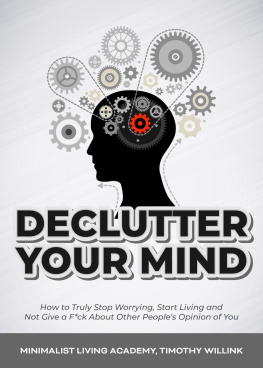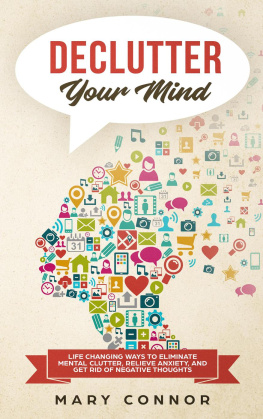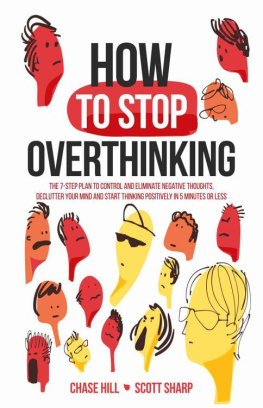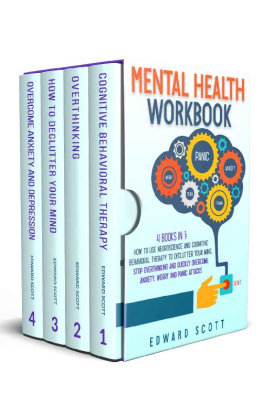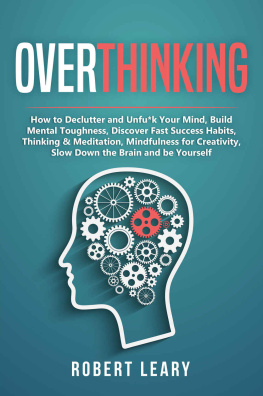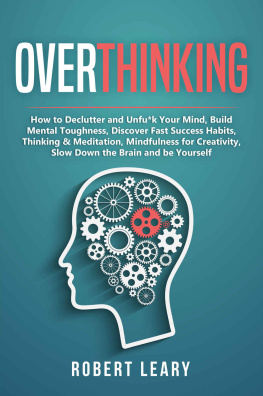DECLUTTER YOUR MIND
How to Stop Worrying, Relieve Anxiety, and Eliminate Negative Thinking
Barrie Davenport
liveboldandbloom.com
Steve S.J. Scott
DevelopGoodHabits.com
Declutter Your Mind Copyright 2016 by Oldtown Publishing LLC
All rights reserved. No part of this book may be reproduced in any form without per-mission in writing from the author. Reviewers may quote brief passages in reviews.
Disclaimer
No part of this publication may be reproduced or transmitted in any form or by any means, mechanical or electronic, including photocopying or recording, or by any in-formation storage and retrieval system, or transmitted by email without permission in writing from the publisher.
While all attempts have been made to verify the information provided in this publica-tion, neither the author nor the publisher assumes any responsibility for errors, omissions, or contrary interpretations of the subject matter herein.
This book is for entertainment purposes only. The views expressed are those of the author alone, and should not be taken as expert instruction or commands. The reader is responsible for his or her own actions.
Adherence to all applicable laws and regulations, including international, federal, state, and local governing professional licensing, business practices, advertising, and all other aspects of doing business in the US, Canada, or any other jurisdiction is the sole responsibility of the purchaser or reader.
Neither the author nor the publisher assumes any responsibility or liability whatso-ever on the behalf of the purchaser or reader of these materials.
Any perceived slight of any individual or organization is purely unintentional.
CONTENTS
YOUR FREE GIFT

liveboldandbloom.com/mindfulness-meditation-series
INTRODUCTION
How Thoughts Determine Our Outcomes
Very little is needed to make a happy life; its all within yourself, in your way of thinking.
Marcus Aurelius
Ever feel overwhelmed by your thoughts? Do you struggle with stress or anxiety about the tasks you need to complete on a weekly basis? Do you want to simply stop worrying about life in general?
We all experience negative thinking from time to time. But if you often feel overwhelmed by these thoughts, then you should closely examine what youre thinking and how your thoughts impact your mental well-being.
This inner monologue is a natural part of your mental landscape. Its there all the time, night and day, reminding you about the groceries you need to pick up, shaming you about missing your sisters birthday, or making you feel anxious about current headlines (like politics, the environment, or the current state of the economy).
These thoughts are the background noise of your life, even though you may not always be aware of their constant presence. Take a second right now and pay attention to your thoughts. Try to stop them. Its hard, right? Youll see how they keep streaming in, one after another, unbidden and often unwanted.
Some of your thoughts are random and useless. My arm itches. It looks like its gonna rain. Where did I put my keys?
On the other hand, many of our thoughts are intrusive and negative. That guy is a jerk. I really screwed up that project. I feel so guilty about what I said to Mom.
Whether they are negative, neutral, or positive, these thoughts clutter our minds , just like your home can get cluttered when you have too many possessions.
Unfortunately, clearing your mental clutter isnt as simple as eliminating a possession. You cant throw away a thought and expect it to stay gone. In fact, like a never-ending game of Whack-a-Mole, your negative thoughts have a way of popping back up as soon as you slap them down.
Why We Think Negative Thoughts
Now, imagine your mind as a fully organized homea home thats free from extraneous, draining, and useless items that agitate you. What if you could surround yourself only with thoughts that uplift, inspire, and soothe you?
Consider for a moment your mind as a peaceful cloudless sky, and you have the power to choose what floats across. If that cloudless mental sky is so desirable, then why do we think so much, with so few filters to sort the positive and necessary thoughts from the random and unnecessary?
Your brain contains about 100 billion neurons, with another billion in your spinal cord. The total number of connections between neuronsthe cells responsible for processinghas been estimated at 100 trillion synapses.
Our powerful brains are constantly processing all sorts of experiences and analyzing them in the form of thoughts. Thoughts form what we perceive to be reality.
We can control and direct our thoughts, but it often feels like our thoughts have minds of their own, controlling us and how we feel. Thinking is necessary for solving problems, analyzing, making decisions, and planning, but in between the times of proactive mental endeavors, the mind roams like a wild monkey, dragging you through the brambles of rumination and negativity.
Your constant inner dialog distracts you from what is happening around you, right here and now. It causes you to miss valuable experiences and sabotages the joy of the present moment.
Absurdly, we assume we need to think more or harder in order to figure out why we arent as happy or fulfilled as we wish we could be. We try to pinpoint the possessions, people, and experiences that might quench our longings and ease our unhappiness. The more we ponder our despair, the more despondent we become. Our thoughts make us restless, empty, and agitated as we project into the future or look to the past for answers.
In fact, nearly every negative thought you have relates to the past or future. Its common to find yourself trapped in a looping cycle of regretful thinking or worry thoughts, even while feeling desperate to escape the never-ending tape playing in your mind.
Not only do you struggle with your thoughts, but you also struggle with your inability to be free of them. The longer the negative thoughts continue to loop, the worse you feel. Its almost as if there were two of youthe thinker and the judge, the person thinking the thoughts and the person aware that you are thinking them and judging how bad they are.
This thinking/judging dynamic infects us with painful emotions. The more fearful, guilt-ridden, regretful thoughts we have, the more stressed, anxious, depressed, and angry we feel. Sometimes our thoughts paralyze us with bad feelings, and its those feelings that rob us of inner peace and contentment.
Although our thoughts are the culprit responsible for so much distress, we assume theres not much to be done about it. You cant stop your mind from thinking, right? You cant shut off your brain at will or rid yourself of the mental chatter and associated feelings that prevent you from enjoying life fully.
Occasionally, we have unexpected moments of mental peace and quiet. More often, however, we try to quell the mental chatter by self-medicating with too much food, alcohol, drugs, work, sex, or exercise. But these are temporary solutions to muffle the noise and ease the pain. Soon enough, our thoughts are back at it again, and the cycle continues.
Are we destined to be victims of our monkey minds at all times? Must we constantly battle our thoughts and allow them to drag us down with worry, regret, and anxiety? Is there a way to have a clear mind, free of negativity and pain?
You may not be able to keep your mental house free from clutter all the time, but you can impact your thoughts enough to improve your quality of life and overall happiness in a profound way. Thinking may seem automatic and uncontrollable, but many of our thought patterns are habitual and, well, thoughtless.


